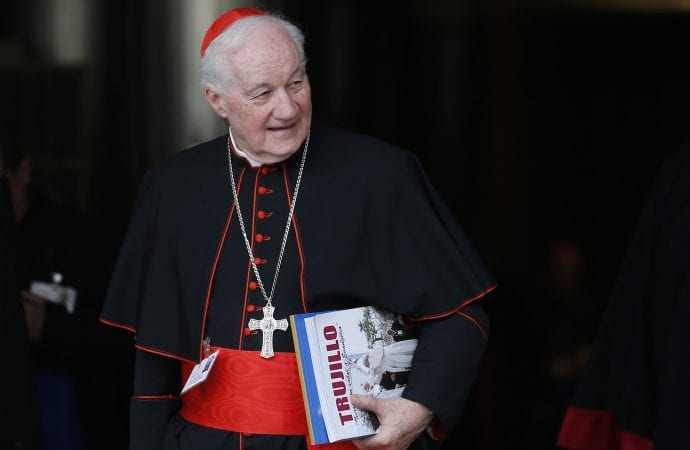A senior Vatican official once rumored to be a candidate for the papacy, said Wednesday that he’s skeptical about ordaining married men to address priest shortages in rural areas such as the Amazon, instead he issued a ringing defense of priestly celibacy.
“I am skeptical, and I think I’m not the only one,” said Canadian Cardinal Marc Ouellet, prefect of the Vatican’s powerful Congregation for Bishops, in a rare press conference Wednesday to present his latest book.
“Above me there is someone who is even more skeptical who has authorized the debate, and that’s OK,” Ouellet said.
Asked if he meant Pope Francis, Ouellet refused to give a yes or no response, but technically speaking the pontiff is Ouellet’s only superior and he’s also the man who set the stage for debate on the ordination of married men known as the “viri probati,” or men of proven virtue, during the Oct. 6-27 Synod of Bishops on the Amazon.
Ouellet’s words came during the launch of his book Friends of the Bridegroom: For a Renewed Vision of Priestly Celibacy, which addresses the challenges priests face amid a decline in vocations and, as he said on Wednesday, a reputational crisis caused by the sex abuse scandals.
Ouellet not only heads the Congregation for Bishops but also the Pontifical Commission for Latin America. Both jobs qualify him to be a member during the upcoming synod, and he joins a group of small but diverse voices who’ve expressed doubts regarding the viri probati.
The pope has allowed the question to be put on the table, but he’s also said he values priestly celibacy and that he’s not planning on changing the Church’s tradition tout court.
Ouellet said he is “open” to the debate taking place during the synod, but also said he’s skeptical about the proposal because the region doesn’t even have enough non-ordained catechists to teach lay people. Training indigenous people to serve as deacons or priests, he said, is an even bigger challenge.
The Canadian cardinal was appointed by Pope emeritus Benedict XVI in June 2010 and Francis has confirmed him in the position, allowing him to stay past the informally accepted five-year mark.
During the book’s presentation, Ouellet insisted that he’s not against having a debate on the ordination of married men, but he also said that at this time in history there’s a need for reflection, hence his contribution “to give something substantial to aid discernment.”
“We have to hear many other voices, also from the territory, the bishops on site,” he told English-speaking journalists. “I need to hear from them to grasp better the situation. But I remain skeptical out of conviction and knowledge of the Catholic tradition.”
Afterwards, he told reporters that he’d given two copies of the book to the pope, and that the Latin American pontiff is allegedly happy that Ouellet weighed in.
He acknowledged that, despite his skepticism, celibacy is a tradition, not a dogma, and it’s not “heresy” to question it.
Overall, Ouellet delivered a strong defense for the value of celibacy in the priesthood, noting that the sacrifice of men who’ve given up a family to be priests is a powerful and “incomparable” witness of evangelization, something the Church needs today.
The cardinal also said that in recent days he’s often been asked why he decided to write the book, and he said that it was meant to be an “encouragement” for priests, who, as of late, have suffered “fairly and unfairly,” and he wanted to “sustain them in their ministry.”
He also said that it was meant to “prolong” the message the pope sent priests on August 4th encouraging them in their ministry.
Writing about this month’s Amazon synod, Ouellet argues that “new missionary strategies are emerging that could have a long-term impact on priestly ministry, either locally or more broadly, given the globalizing influence of a borderless media culture.”
“Some aspire to the rapid adoption of the pastoral solution of the viri probati - that is, married men, heads of stable families, who could be ordained priests in order to ensure the Eucharistic celebration for dispersed indigenous communities to whom the value of celibacy seems foreign.”
“These prospects may be attractive to some,” he adds, “and cause concern elsewhere,” particularly taking into account that there are ideological and strategic elements that are intertwined in the search of more “ambitious and important results at the universal level.”
The Canadian also argued there are some “liberal” or “protesting currents of thought” resurfacing “to take advantage of the situation and to propose reform programs that go beyond Pope Francis’s intentions and orientations.”

